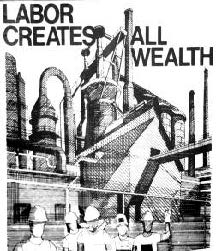
EL SALVADOR, April 1—Men and women workers make the world function. They make the factories function, they work the fields, they transport the products. It is more and more evident that the capitalists are parasites on humanity. They are the owners of the means of production and their actions, based on the defense of their interests, can put hundreds of workers at risk.
Sweat-Shop Bosses Skip Town
The recent closing of a maquila garment sweatshop is a sign of this. Communist ideas help us to understand the reasons for these actions and how to convert these situations into opportunities to mobilize the masses for communism. This was the basis of the discussion in the latest meeting of the industrial club of ICWP in El Salvador.
“The boss signed over the containers with the products and the machinery to the bank. He signed over the factory and left.” These were the words of a worker in the free trade zone of San Salvador after the flight of a Korean businessman and the firing of hundreds of co-workers in one of the many factories in the area.
That’s how our discussion began with the men and women workers of the free trade zone (garment factories) in which new members of ICWP from the closed factory and university students participated.
First we focused on the factory closing. This left hundreds of workers without work, many of whom were at the meeting. In the face of this situation, we analyzed the social relations of production under capitalism and how different they will be in the new communist society.
The discussion brought forward comments made within the industrial complex immediately after the closing of this maquila. We exposed the argument of the supervisors and the bosses who claimed that factories close because people don’t work hard enough.
These same workers criticized what the union had done. They accused the union leaders of dividing the workers and seeking benefits only for their members and not for the majority. From this criticism we also discussed the need to return to the mass distribution of our ideas through leaflets. We decided to write a leaflet explaining why factories are closed and how we would control the means of production in a classless society.
“Beyond the daily struggles against the bosses which are necessary, our struggle must be organizational because we fight for system change; we fight for communism,” said a university student.
Do We Need the Bosses?
The discussion turned from the problem of the factory closing to ask whether the bosses are necessary to make the factories function. The majority said that they are not, since they see daily how in their centers of production it is their co-workers who spend their lives working while the bosses get rich from this work.
A garment worker in the meeting expressed her doubts about whether we can really live without money and without bosses. A young man responded: “The workers can make the factories produce without the need for a boss. You are the most valuable element in a factory, the most valuable element in the production process. However, to reach the point where the working class takes control of the factories and decides how and how much to produce we must go through a process of revolutionary communist transformation.”
The question “Do we need the bosses?” was an excellent introduction to the topic that we had prepared to discuss in this meeting: money and the accumulation of wealth. We talked about the history of private property, the different economic systems, and how money and private property arose. And beyond that, we proposed a discussion about whether we can live without money, if we can build a world without money in the historical process in which we find ourselves, that is, in our time.
The meeting was an advance in the discussion of communist ideas in the industrial club of ICWP. The young university students who attended were glad to participate in this type of profound political discussion with industrial workers. This was a big step in the consolidation of the worker-student participation in the country.
We ended the activity by planning the May Day March where we hope to participate with a block of communists from the factories, fields and universities.

